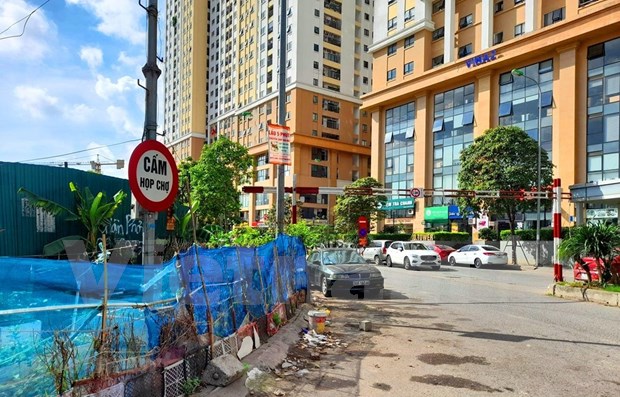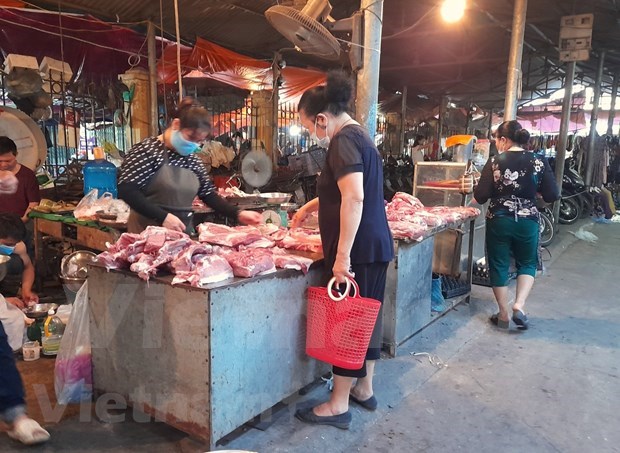Hanoi sees decrease of household waste during pandemic time
 This place was a busy spontaneous market in the Kim Van-Kim Lu new urban area before pandemic (Photo: Vietnam+)
This place was a busy spontaneous market in the Kim Van-Kim Lu new urban area before pandemic (Photo: Vietnam+)Hanoi (VNA) - Thanks to strict implementation of COVID-19 prevention and control measures, the volume of daily domestic waste in Hanoi has decreased by about 10% compared to the pre-pandemic time.
To prevent the spread of the disease, the authorities of Hanoi has required spontaneous markets (commonly known as “toad market” by locals), restaurants and shops to close temporarily. The move has contributed to reducing the amount of daily domestic waste, especially plastic waste in residential areas and on the streets of Hanoi.
An official from the Hanoi Department of Construction told VietnamPlus Electronic Newspaper that in the past one month, the volume of domestic waste in the city has decreased by about 10% compared to the time before the pandemic.
Due to the shutdown of spontaneous markets, Mrs. Nguyen Thi Hoa, 63 years old, who has been living with her son’s family in the Kim Van – Kim Lu new urban area (Dai Kim ward, Hoang Mai district) for around two months, has to change her way of shopping. Now, instead of shopping at toad markets, she uses apps to make online orders or goes to several supermarkets nearby, around twice a week. After half a month, she has found that this way of shopping is so interesting. She said it helps limit the number of plastic bags.
“When I lived in the countryside before, I usually used banana leaves to wrap meat, fish or vegetables and then put all of them to a plastic hand basket. It is so different from toad markets here where a lot of plastic bags are used daily for wrapping. However, since the pavement markets closed, I see an obvious decline of plastic bags in my family”, she shared.
Like Mrs. Hoa, many residents in the urban area also choose to go shopping every two or three days. This change not only helps them reduce the risks of being infected with the coronavirus, but also contributes to limiting the use of plastic bags which are so unfriendly to the environment. As a result, the daily volume of household waste in the area is also smaller over the past days.
 Residents in Dai Kim ward, Hoang Mai district, use hand basket to limit the use of plastic bags (Photo: Vietnam+)
Residents in Dai Kim ward, Hoang Mai district, use hand basket to limit the use of plastic bags (Photo: Vietnam+)Some people even decided to say goodbye to plastic bags. One of them is Mr. Nguyen Van Toan, who is living in a condominium in Hoang Mai district. Toan said 10 years ago, when he lived and studied in France, he hardly saw plastic bags thrown to streets. Especially, many French shoppers chose cloth bags instead of plastics to contain foodies. Being well aware of potential harms that plastic bags will cause to the environment, Toan decided to buy a rattan basket from his hometown of Phu Tho, and now he always brings it with him in every shopping.
“I always keep several big cloth bags in my backpack, and therefore, every time I have to go shopping after fishing office work, I do not have to use plastic bags. In my house, you could hardly to see plastic bags”, Toan said.
Such behavior with plastic bags may seem a bit strange, even odd, to some people, who are always busy with a lot of work. However, in the time of complicated pandemic developments, many people have changed their mind and even begin to follow the way of shopping of Mrs. Hoa and Mr. Toan. Although the number of responsible shoppers is still small, but a small spark can start a great fire. Their sense of responsibility and good aware of environment protection, soon or late, will encourage others to follow.
The reduction of domestic waste was seen not only in Hoang Mai, but also in other outskirt districts of the city, such as Phu Xuyen and Thanh Tri. Representatives of garbage collecting companies in the districts told VietnamPlus that the amount of waste they collect recently are from 80 to 90 tons per day in some areas, considerably decreased compared with 100 tons before the pandemic.
To curb the spread of the pandemic, including the risks from domestic waste, the Ministry of Natural Resources and Environment has recently issued a number of documents, urging localities across the country to focus on the work of collecting, transporting and treating wastes.
The ministry also asked the localities to apply more strict inspection measures with wastes from hospital and health facilities, as this is also a possible source of infection.
Local authorities must contact with waste treatment facilities to support their localities in case they are able to treat hospital wastes, the ministry added./.













